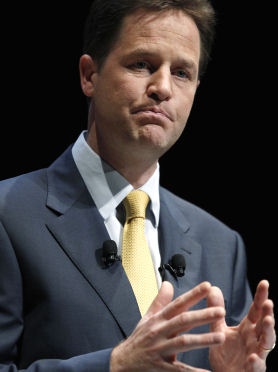The politics of nudge and shove
Do we need to be nudged in the direction of government policy – or will it only work if we’re shoved? Gaby Hinsliff explains the ways that Ministers are trying to change us.

What connects Nick Clegg’s occasional sneaky fag with housing benefit and the Big Society?
At first sight, not much. But if the Deputy Prime Minister wants some insight into his confessed inability to stop smoking, he should drop by the Downing Street office of the government’s Behavioural Insight Unit, experts in the so-called “politics of nudge”.
The phrase was coined by two American economists – Cass Sunstein and Richard Thaler – the latter visited Downing Street just last month. Their argument is that people do things they know are bad – eating junk food, not saving for retirement, binge drinking – because it’s easier not to change and we dislike tough decisions. So relatively cheap, simple ways of making it easier to be “good” can deliver big changes – and big savings in healthcare, policing or welfare.
Nudge v shove
In opposition, the Conservatives championed nudge: but facing huge behavioural challenges like getting the long term sick back to work, Ministers have chosen lately to shove. You could “nudge” benefit claimants out of big, expensive houses by, say, letting them keep part of the money saved if they downsize – or even by restricting housing benefit for future claimants. But restricting it for existing claimants and risking evictions is essentially a shove, as is time-limiting some disability allowances.
Exhorting them to get on a bus isn’t necessarily enough when, as Clegg illustrates, even obviously harmful habits are hard to break.
Perhaps nudge was never suited to really tough problems – or to fast, deep spending cuts. But this government still needs nudge too, if the Big Society solution to long term social problems means anything.
Gentle prod
It’s hard to force people into volunteering, being neighbourly, or forging community ties: a Big Society is about gently prodding people who mean well but never quite get around to getting involved.
And a key tenet of nudge is that what we see around us shapes our decisions – so arguably, if worklessness is the norm in a deprived neighbourhood, it’s what many people will fall into. Exhorting them to get on a bus isn’t necessarily enough when, as Clegg illustrates, even obviously harmful habits are hard to break.
Nor is this tension between nudge and shove just some abstract clash of ideas. One of the communities chosen to pilot Big Society ideas is Liverpool, a city with some areas of high welfare dependency where people face benefit cuts.
Can you nudge and shove a community simultaneously? We’re about to find out.
Gaby Hinsliff is the former Political Editor of the Observer newspaper
-
Latest news
-
‘I violated my moral compass working for Trump,’ former lawyer testifies3m

-
Working class creatives in film and TV at lowest level in decade5m

-
Israeli police investigating attack on Gaza aid convoy4m

-
Biden announces major tariff increase on Chinese-imported green tech3m

-
‘If NHS can afford it, people with obesity should have Semaglutide,’ says weight loss expert5m

-




